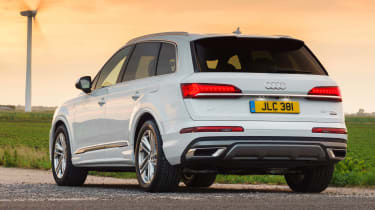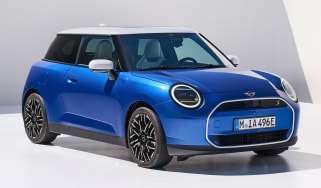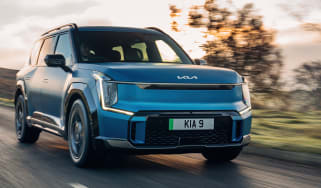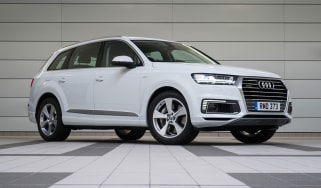Audi Q7 hybrid review
Thanks to plug-in hybrid technology, the Audi Q7 TFSI e offers potentially very low running costs and an electric range of over 25 miles
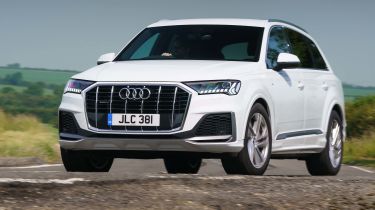
Pros
- Never feels underpowered
- Spacious and practical
- High-quality interior
Cons
- Gearbox can be jerky
- 'Haptic' touchscreen
- Uninvolving to drive
| Car type | Electric range | Fuel economy | CO2 emissions |
|---|---|---|---|
| Plug-in hybrid | 28-29 miles | 105-109mpg | 58-67g/km |
In recent times, Audi has been on something of a plug-in hybrid mission – with the Q7 TFSI e being one of the German carmaker’s largest electrified models. Others include plug-in versions of the A7 four-door coupe, the A8 limousine and Q5 SUV, which is the Q7’s smaller sibling. The big Q7 originally came with a larger battery pack than some of its hybrid stablemates, but in early 2021 the other models got a battery upgrade to bring them into line.
This isn’t actually the first plug-in Q7: Audi previously offered the Q7 e-tron, which was a diesel-electric hybrid. But with diesel falling out of favour with motorists, the German brand has decided to go down the petrol-electric route for its latest plug-in Q7, dropping the 'e-tron' badge in favour of 'TFSI e' – although the former is still used for fully electric Audis, such as the e-tron SUV.
Ignoring the TFSI e’s electrified elements, it remains an upmarket large SUV that promises plenty of space, quality and refinement – just like non-hybrid Q7s. Focusing on the hybrid aspect, though, the Q7 TFSI e promises strong performance and the potential for relatively low running costs (for its size and weight) thanks to modest CO2 emissions and strong fuel economy.
Audi offers two powertrains for this Q7 – 55 TFSI e and 60 TFSI e. The basic difference between the two is power output, while other components, such as gearbox, are the same. Regardless of powertrain, the Q7 plug-in offers rapid acceleration: combining a 3.0-litre V6 engine with an electric motor was always going to result in brisk performance. As for trims, there are five to choose from.
With prices running from around £67,000 to around £97,000, the Audi is comparable with its rivals: the BMW X5 xDrive45e, Volvo XC90 Recharge and Range Rover Sport PHEV all start in and around the £65,000 to £70,000 mark. Each offers much the same as the Q7, in that they're large, luxurious SUVs with petrol-electric powertrains – although only the Range Rover and Volvo are available as seven-seaters.
All things considered, the Q7 TFSI e is a much more relevant car than the old diesel Q7 e-tron. While the plug-in Q7 will no doubt offer some savings to those who'd otherwise run a diesel or petrol Q7 (especially company-car drivers) it isn’t as straightforward a financial decision as some smaller plug-in hybrids. For a more detailed look at the Q7 TFSI e, read on for the rest of our in-depth review…
